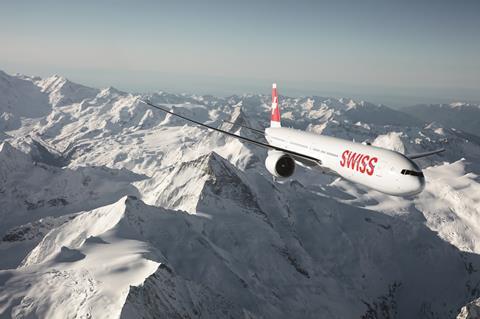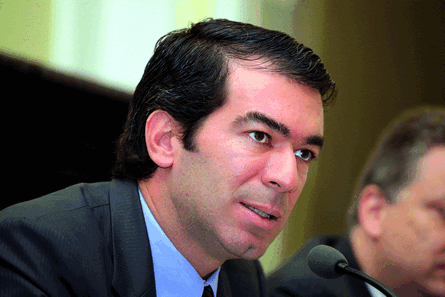Swiss International Air Lines posted a record profit for 2023 as healthy demand for air travel and disciplined cost-cutting allowed the airline to “definitively master the corona crisis and the major challenges that it posed”.
Full-year profit at the Basel-headquartered airline, which is a part of Lufthansa Group, rose to Swfr718.5 million ($817 million), up 58% from 2022, the company reported on 7 March. That result “will enable Swiss to invest even more extensively in its own continued viability”, the airline adds.
The carrier’s earnings margin for the year was 13.5%, up from 10.4% last year and the highest – by lengths – among its Lufthansa Group peers. The next-best airline in the group was Eurowings with a 7.9% EBIT margin, followed by Austrian Airlines at 5.4%.
Swiss’ full-year revenue rose to Swfr 5.3 billion, up 21% from last year, but flat from pre-pandemic 2019.
“The results were unbelievably important to us, and for our investments in the future,” says chief executive Dieter Vranckx. “We had some difficult times, but led the company through the crisis with the right decisions, and 2023 is the best proof that we went in the right direction.”

With that profit, Swiss accounts for about one-third of the Lufthansa Group’s full-year operational results – an out-sized role for a small subsidiary of one of Europe’s largest airline conglomerates.
That said, Vranckx notes that 2023 posed “substantial” challenges and the airline is still struggling with some of the after-effects of the global Covid-19 crisis.
“The pandemic may be behind us, but the supply and demand within the airline sector have yet to regain the balance they had in pre-corona times,” says chief financial officer Markus Binkert.
One metric the airline is not proud of is its 60% on-time performance rate. It now has a plan to raise that to 80% in the next two years, Binkert adds.
By 2027, Swiss plans to invest in “up to Swfr 5 billion” in the fleet, customer experience improvements, employees and sustainability initiatives.
SWAN SONG
The company’s 2023 earnings report was a swan-song of sorts for Vranckx and Binkert, both of whom will leave the company in the coming months. In addition, it was the first major public event for chief commercial officer Heike Birlenbach, who joined the Swiss management board at the beginning of this year.
Swiss said last week that Binkert will be replaced by Dennis Weber, currently Lufthansa Group head of investor relations, and that Oliver Buchhofer, currently head of operations, will join as a fourth management board member in the role of chief commercial officer. Both will begin their respective jobs in May.
Swiss has not yet named a successor for Vranckx, who will become chief commercial officer at Lufthansa Group, while remaining deputy chair of Swiss’ board of directors. Vranckx has led the company since 2021, through its post-Covid restructuring, including paying back all of the airline’s government-guaranteed bank loans as well as loans from Lufthansa Group – ahead of schedule – earlier this year. That achievement has allowed the airline to once again invest in itself, he says.
Expanding the airline’s top management body to four from its current three will “put more pressure” on the carrier’s leadership to focus on operations and raise on-time performance. Vrackx says the management shuffle was strategic, and having three of four management board members already in place “gives a sense of stability to the company and the teams”.
“I did not worry that we will move from stability to instability… our corporate culture puts a great deal of weight on empowerment, and gives responsibility to team members,” he says.
That said, such complete management changes – the entire executive board will have been replaced within the first six months of 2024 – often fuel speculation that the airline could be in for an ownership change as well, rumours that Vranckx was eager to quash.
“There is no information, no goal, to sell Swiss,” he says. “It wouldn’t make sense. Swiss is an important part of Lufthansa Group and Lufthansa is important to us. We have Lufthansa to thank for much of our success.”
Lufthansa had acquired Swiss in 2005, and the integration was completed in 2007. Since then, it has been marketing the carrier as a premium airline with a strong focus on business travel. But that business traffic has not yet returned to pre-pandemic levels, and has stagnated around the 70% mark, the company says.
Though that is not where managers hoped it would be, the difficult coronavirus years taught the company valuable lessons about managing through unknowns, and Vranckx says that experience has placed it in a formidable competitive position going forward.
“We have learned in our business that anytime, anything can happen,” he says. “Who would have known we’d have a war in Europe? Corona taught us not only to be flexible in a crisis, but to use that flexibility as a strength, and to use it to improve things.“
Overall, Swiss said it transported 16.5 million passengers in 2023, three million more than the previous year, with a load factor of 84.5%, up 3.6 percentage points over 2022. System-wide capacity was at about 87% of pre-Covid levels. It intends to lift capacity to 95% this year.
The airline ended 2023 with 87 aircraft in its in-service fleet. It has orders for 10 further Airbus A320neos and five A321s, as well as five A350-900s. The carrier will, going forward, take delivery of one airframe per quarter on average, Binkert says.


























